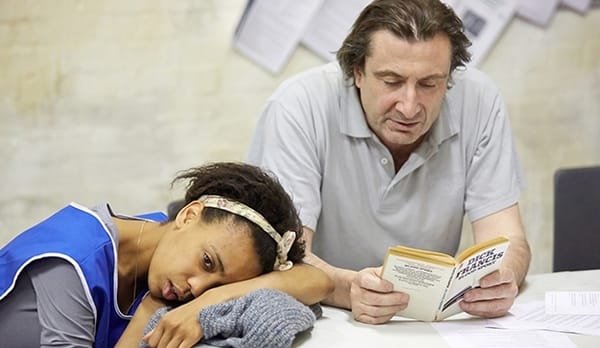Do you really care about the NHS?
Jack Steadman definitely does, and so does Michael Wynne, writing for the Royal Court.

The title of Michael Wynne’s latest work, Who Cares, is both deliberately provocative and perfectly explanatory of what the audience entering the Royal Court have signed themselves up for. This production for the Jerwood Theatre Upstairs is less ‘state of the nation’ and more ‘state of the national health service’, a no-holds barred examination of how the NHS has fared, is faring, and will fare under the previous and future governments.
The play poses a series of striking questions, the first of which is nothing to do with the NHS, but is instead ‘where the hell am I going?’ Ostensibly taking place in the Court’s studio theatre, the show actually kicks off by queueing in the alley next to the theatre, between it and the rehearsal/office building located next door.
The doors to the rehearsal building are opened, and each audience member is given a coloured lanyard (most of which mark out audience members as ‘patients’, curiously) and ushered into a waiting room ripped straight out of a hospital Accident & Emergency department.
"It's all a bit awkward. A bit confusing. Which makes it instantly immersive."
A small group of actors occupy seats in the centre of the room, in various states of disarray. Blue curtains, of the same sort that can be found in hospitals across the country, obscure the edges of the room. Double doors are dotted throughout, with the occasional blurred figure moving behind them. A cleaner appears from the end of the room, mopping around the clustered audience members. Some move out of the way to allow her to mop the patch of floor they were standing on. It’s all a bit awkward. All a bit confusing. This would be a negative, were it not for the fact it makes the whole thing instantly immersive. It already feels like the entire audience are awkwardly standing in a waiting room, hoping for instructions.
Suddenly, without warning, all hell breaks loose. Actors appear from all sides, blasting through one set of double doors into the waiting room, only to immediately disappear through another set. The first speaker is Marjorie, a nurse from Yorkshire, played with real warmth and humanity by Eileen O’Brien. She starts describing her path into the health service, as all around her various characters interject with stories, facts, statistics and more. Some speak into a microphone at the side of the room, their voice blaring through the tannoy, some address the audience directly, others converse with each other. The whole scene is beautifully orchestrated chaos, and the audience are trapped in the middle of it. Looking in, but constantly aware that there is more going on behind them. Within just a few minutes, even this tiny room feels like a part of something far larger.
Then, as quickly as it began, the madness stops. Everyone has disappeared. The lights rise, and the audience are quickly separated into groups. From here, the promenade part of _Who Cares _really comes into force, as the existence of multiple groups allows for the existence of several short scenes that can all run concurrently, with each group then being guided onto the next. It can only have been nothing short of a logistical nightmare to work out where everyone should be (and when), a process honed to a fine degree during previews, and it’s to the immense credit of everyone involved in the production – from the front of house staff physically guiding the audience members from station to station to the cast themselves, playing multiple roles, often with mere seconds to change ahead of the arrival of an audience – that it all comes together so magnificently.
The production makes use of all of the space available to the Royal Court bar the main theatre – nothing is off-limits here. The stage door becomes just another entrance, the storage locations in the roof of the building turning into an operating theatre. It’s in this operating theatre at the very top of the building that one of the more memorable scenes takes place, as a former Chief Executive of the NHS and an ex-Department of Health National Director discuss the relationship between politicians and the NHS while they dissect a corpse. Except, in this instance, the ‘corpse’ is actually one of the dummies seen in classrooms across the country, used to teach pupils basic anatomy. The plastic entrails soon end up everywhere, with one lung even ending up being thrust into an unsuspecting audience member’s hands. The Ex-Exec and former Director leg it, leaving a confused nursing team (and somewhat startled audience member) to pick up the pieces as the audience are ushered out. A fine metaphor for the NHS, if ever there was one.
"Who Cares is based, entirely, on interviews with people across the NHS."
From that point onwards, the play begins to deal with two main issues: the inquiry into the Mid-Staffs hospital trust, and the passage of the 2012 Health and Social Care Act. There’s a real sense of anger that runs through these scenes, with some truly heart-breaking testimonies being given as well as detailed, unflinching political analysis. There’s an unswerving sense of realism occupying the whole play, particularly in theses scenes, and there’s a very good reason for that. _Who Cares _is based, entirely, on interviews with people across the NHS. With patients, campaigners, cleaners, nurses, students, junior doctors, GPs, consultants, surgeons, Chief Executives, anyone and everyone who has any dealings with the NHS. Their words are reproduced verbatim, reeled off by a talented cast, who imbue each character with a sense of the real person originally speaking the words, even when faced with the unenviable task – as mentioned – of handling multiple roles.
The closing moments of _Who Cares _are unspeakably moving. There’s such a visceral sense of pain and anger at what’s happening to the NHS that it’s impossible not to feel moved, and there are more than a few damning verdicts on the political mishandling of the service as a whole. It’s most fitting, though, that the play ends as it began, with Marjorie addressing the audience directly. The NHS may be bureaucratic and incomprehensibly sprawling. It may at times feel deeply impersonal, and cold. But the people who work in it, for it, are humans too, and many (if not all) of them are wonderful human beings who do it because they care. The personal touch matters. That we receive it even in this facsimilie of the NHS is truly marvellous.
Who Cares was at the Royal Court until the 16th May.









